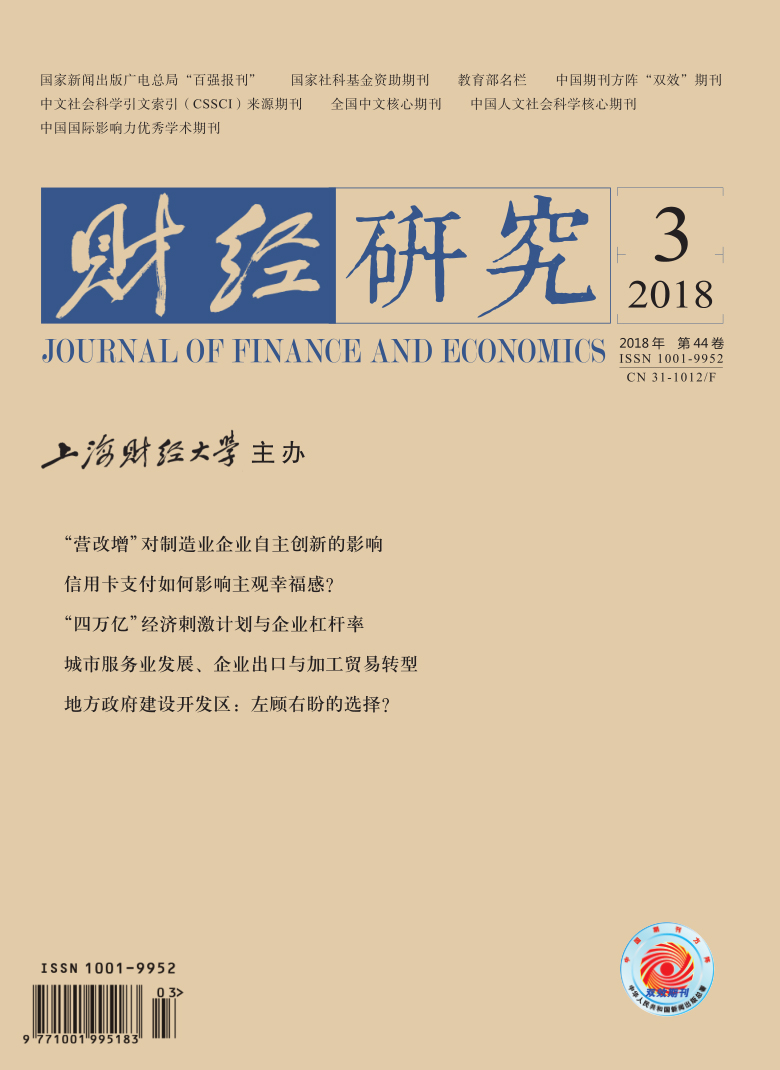信用卡是一项功能性金融基础设施,现有研究多数止步于信用卡的消费溢价效应,尚未关注其终极福祉效应。文章基于萨缪尔森幸福公式,分析了信用卡支付影响主观幸福感的作用机理,阐述了其并联机制和串联机制。在此基础上,文章运用条件混合过程模型评估了信用卡支付对主观幸福感的影响,采用因果中介效应分析方法识别了其作用机制。研究发现,信用卡支付显著侵蚀了持卡人的主观幸福感,幸福侵蚀效应是通过串联机制而非并联机制传导的。具体来说,信用卡支付经由欲望膨胀渠道和消费实现渠道所构成的串联机制,降低了持卡人的主观幸福感。另外,信用卡支付的幸福侵蚀效应会因使用动机、家中地位以及城乡和地区差异而表现出异质性。
信用卡支付如何影响主观幸福感?—基于萨缪尔森幸福公式的研究
摘要
参考文献
1 甘犁, 尹志超, 贾男, 等.中国家庭资产状况及住房需求分析[J].金融研究, 2013, (4): 1—14.
2 李江一, 李涵, 甘犁.家庭资产-负债与幸福感: " 幸福—收入”之谜的一个解释[J].南开经济研究, 2015, (5): 3—23.
4 廖理, 沈红波, 苏治.如何推动中国居民的信用卡消费信贷——基于住房的研究视角[J].中国工业经济, 2013, (12): 117—129.
5 刘宏, 明瀚翔, 赵阳.财富对主观幸福感的影响研究——基于微观数据的实证分析[J].南开经济研究, 2013, (4): 95—110.
6 王俊秀, 杨宜音.2011年中国社会心态研究报告[M].北京: 社会科学文献出版社, 2011.
7 Bayer P J, Ross S L. Identifying individual and group effects in the presence of sorting: A neighborhood effects application[R]. Economic Research Initiatives at Duke (ERID) Working Paper No.51, 2009.
8 Bénabou R, Tirole J. Incentives and prosocial behavior[J]. The American Economic Review, 2006, 96(5): 1652—1678. DOI:10.1257/aer.96.5.1652
9 Dolan P, Peasgood T, White M. Do we really know what makes us happy? A review of the economic literature on the factors associated with subjective well-being[J]. Journal of Economic Psychology, 2008, 29(1): 94—122. DOI:10.1016/j.joep.2007.09.001
10 Hodson R, Dwyer R E, Neilson L A. Credit card blues: The middle class and the hidden costs of easy credit[J]. The Sociological Quarterly, 2014, 55(2): 315—340. DOI:10.1111/tsq.12059
11 Imai K, Yamamoto T. Identification and sensitivity analysis for multiple causal mechanisms: Revisiting evidence from framing experiments[J]. Political Analysis, 2013, 21(2): 141—171. DOI:10.1093/pan/mps040
12 Karlan D, Zinman J. Expanding credit access: Using randomized supply decisions to estimate the impacts[J]. Review of Financial Studies, 2010, 23(1): 433—464. DOI:10.1093/rfs/hhp092
14 Lo H Y, Harvey N. Shopping without pain: Compulsive buying and the effects of credit card availability in Europe and the Far East[J]. Journal of Economic Psychology, 2011, 32(1): 79—92. DOI:10.1016/j.joep.2010.12.002
15 Lopes P. Credit card debt and default over the life cycle[J]. Journal of Money, Credit and Banking, 2008, 40(4): 769—790. DOI:10.1111/j.1538-4616.2008.00135.x
16 Maslow A H. A theory of human motivation[J]. Psychological Review, 1943, 50(4): 370—396. DOI:10.1037/h0054346
17 McPherson M, Smith-Lovin L, Cook J M. Birds of a feather: Homophily in social networks[J]. Annual Review of Sociology, 2001, 27(1): 415—444. DOI:10.1146/annurev.soc.27.1.415
18 Prelec D, Loewenstein G F. The red and the black: Mental accounting of savings and debt[J]. Marketing Science, 1998, 17(1): 4—28. DOI:10.1287/mksc.17.1.4
19 Prelec D, Simester D. Always leave home without it: A further investigation of the credit-card effect on willingness to pay[J]. Marketing Letters, 2001, 12(1): 5—12. DOI:10.1023/A:1008196717017
21 Samuelson P A. Economics: An introductory analysis (7th ed.)[M]. New York: McGraw-Hill Book Company, 1967.
22 Shah A M, Eisenkraft N, Bettman J R, et al. Paper or plastic? How we pay influences post-transaction connection[J]. Journal of Consumer Research, 2016, 42(5): 688—708. DOI:10.1093/jcr/ucv056
23 Thaler R. Mental accounting and consumer choice[J]. Marketing science, 1985, 4(3): 199—214. DOI:10.1287/mksc.4.3.199
24 Wu Y, Schwartz A, Stillwell D, et al. Birds of a feather do flock together: Behavior-based personality-assessment method reveals personality similarity among couples and friends[J]. Psychological Science, 2017, 28(3): 276—284. DOI:10.1177/0956797616678187
引用本文
傅联英. 信用卡支付如何影响主观幸福感?—基于萨缪尔森幸福公式的研究[J]. 财经研究, 2018, 44(3): 32–44.
导出参考文献,格式为:





 9234
9234  9385
9385

